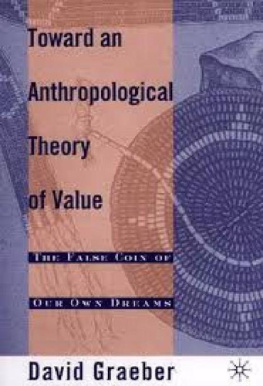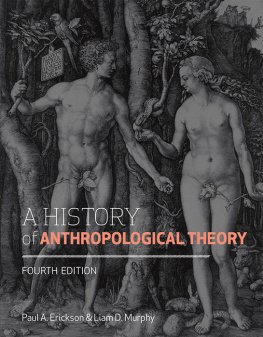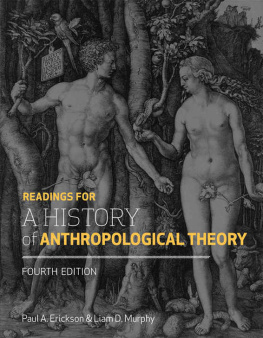ENGAGING ANTHROPOLOGICAL THEORY
This lively book offers a fresh look at the history of anthropological theory. Covering key concepts and theorists, Mark Moberg examines the historical context of anthropological ideas and the contested nature of anthropology itself. Anthropological ideas about human diversity have always been rooted in the sociopolitical conditions in which they arose, and exploring them in context helps students understand how and why they evolved, and how theory relates to life and society. Illustrated throughout, this engaging text moves away from the dry recitation of past viewpoints in anthropology and brings the subject matter to life.
Mark Moberg is Professor of Anthropology at the University of South Alabama, USA, and has many years experience of teaching anthropological theory. His books include Slipping Away: Banana Politics and Fair Trade in the Eastern Caribbean (Berghahn 2008).
First published 2013
by Routledge
2 Park Square, Milton Park, Abingdon, Oxon OX14 4RN
Simultaneously published in the USA and Canada
by Routledge
711 Third Avenue, New York, NY 10017
Routledge is an imprint of the Taylor & Francis Group an informa business
2013 Mark Moberg
The right of Mark Moberg to be identified as author of this work has
been asserted by him in accordance with sections 77 and 78 of the
Copyright, Designs and Patents Act 1988.
All rights reserved. No part of this book may be reprinted or
reproduced or utilised in any form or by any electronic, mechanical,
or other means, now known or hereafter invented, including
photocopying and recording, or in any information storage or retrieval
system, without permission in writing from the publishers.
Trademark notice: Product or corporate names may be trademarks
or registered trademarks, and are used only for identification and
explanation without intent to infringe.
British Library Cataloguing in Publication Data
A catalogue record for this book is available from the British Library
Library of Congress Cataloging in Publication Data
Moberg, Mark, 1959
Engaging anthropological theory : a social and political history /
Mark Moberg.
p. cm.
Includes bibliographical references and index.
1. AnthropologyPhilosophy. 2. AnthropologyHistory.
3. AnthropologyMethodology. I. Title.
GN33.M575 2012
301.01dc23 2012008708
ISBN: 978-0-415-69999-0 (hbk)
ISBN: 978-0-415-80916-0 (pbk)
ISBN: 978-0-203-09799-1 (ebk)
Typeset in Bembo
by HWA Text and Data Management, London
CONTENTS
FIGURES
TABLES
BOXES
ACKNOWLEDGMENTS
As readers will soon learn, this text adopts a decidedly unconventional approach to the history of anthropological theory. Its orientation is rooted in a gradual evolution in the way that I have taught the subject to seniorlevel undergraduates over more than two decades. Having come of age professionally during the years that postmodern critiques redefined anthropology, I have sought ever since to reconcile the best of what is offered by the newer critiques and my own grounding in anthropologys traditional empirical conventions. I have also tried to convey to my students how anthropological ideas are rooted in broader social forces, including (among many others) the administration of colonial societies, movements for national independence, and domestic politics affecting the expression of academic thought. Finally, this book reflects my own idiosyncratic approach to teaching, recognizing that even ideas with serious import are often best conveyed with a dash of humor. Indeed, I have found occasional irreverence to be the most effective means of overcoming student fears of anthropological theory as a daunting and dry subject. To some extent, my approach to this book was inspired by a wonderful little volume by Thomas Cathcart and Daniel Klein, Plato and Platypus Walk into a Bar: Understanding Philosophy through Jokes (2006). Indeed, where their insights are relevant to the philosophical issues raised in anthropology over recent decades, I have cited a number of their witticisms in the pages that follow.
I would like to thank the Senior Publisher at Routledge, Lesley Riddle, for her steadfast support of this project through each of the steps of writing, review, revision, and publication. Given my difficulty in persuading other publishers of the merits of approaching anthropological theory in a lessthansomber fashion, I deeply appreciate her faith in this project. Throughout, her counsel and encouragement have greatly strengthened the final manuscript. Routledges Senior Editorial Assistant, Katherine Ong, provided reassuring guidance throughout the formidable process of procuring permissions and illustrations for the volume. Thanks go as well to April Hopkins for her skilful renderings of three of the drawings featured in the book. And I owe my heartfelt gratitude to the five anonymous reviewers whose insightful critiques helped me to sharpen my arguments and rein in my occasional excesses. Any defects or lapses that remain are, of course, entirely my own.
Finally, I would like to thank the hundreds of students that I have taught over the years in my anthropological theory classes. Many have found themselves in the course not by choice but by their academic requirements. Nonetheless, they have been patient and always supportive audiences as I have tried to figure out what works in the classroom and what doesnt. Their responses, questions, and critiques have immeasurably improved my effectiveness as a teacher and loom large in the way I planned and executed this volume. I hope they will recognize something of themselves in the chapters that follow. Special thanks go to E.M.L., who encouraged this project from the outset, reviewed draft chapters, and assisted in the correction of galleys.
Every effort has been made to trace copyright holders and obtain permission to reproduce material. Any omissions brought to the attention of the publisher will be remedied in future editions.
1
OF POLITICS AND PARADIGMS
Slaying the anthropological undead: a note to students
If you have this text in hand, chances are that you are embarking upon a course in the history of Anthropological Theory, which is likely a required course if you are majoring in anthropology. If my experience in over 20 years of teaching this course is representative, there is a chance that you are anxious about the semester that awaits you. Id like to begin with a word of reassurance: the large majority of students who enroll in such courses manage to complete them and from there go on to graduate with anthropology degrees. Some go on, despite their initial ambivalence about anthropological theory, to careers in anthropology. And not a few even emerge with a real love of the ideas and debates that have shaped anthropology over the history of our discipline.
Lest you think that you could have spared yourself this experience by majoring in anthropology at another university, let me quickly disabuse you of this assumption. Courses in the history of theory are required in virtually all anthropology programs; so, if nothing else, you are not alone. Think of it positively, as you are sharing a rite of passage completed by all previous anthropology students, and even your professors in their time! For those of you whose interests are physical anthropology or archaeology, this book may seem inexplicably far from your concerns, as we will focus here on the theory and history of cultural anthropology. Why do you have to take this course? Credit the father of American anthropology, Franz Boas, who was responsible for the uniquely North American four field emphasis in our discipline. Boas viewed cultural anthropology, linguistics, archaeology, and physical anthropology as related fields examining distinct aspects of the human condition, a viewpoint that accounts for the fact that anthropology departments are usually comprised of a more disparate group of scholars than other programs. For this reason, the completion of your undergraduate education in anthropology requires some familiarity even with subfields far from your particular interests. If it is any consolation, I not only had to complete my share of archaeology and physical anthropology classes, but found myself teaching these subjects as a graduate student and newly-minted PhD.








